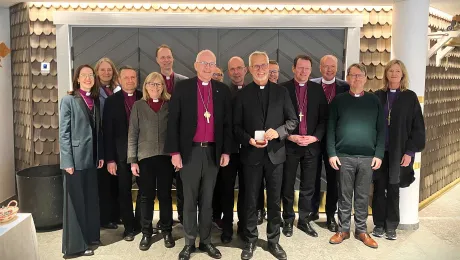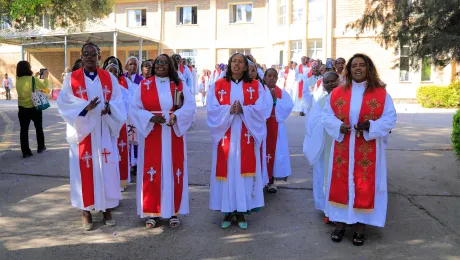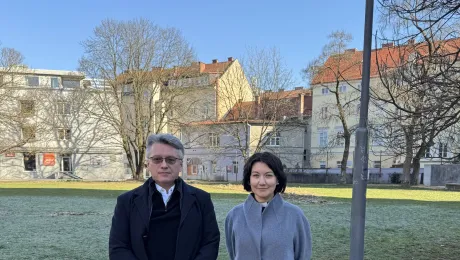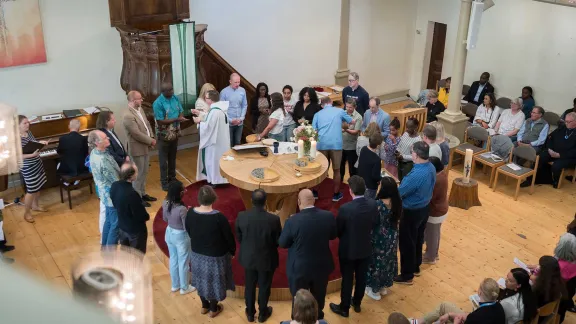
LWF Assistant General Secretary for Ecumenical Relations, Prof. Dirk Lange distributes Holy Communion as Council members join the local congregations of the Evangelical Lutheran Church of Geneva for Sunday worship. Photo: LWF/A. Hillert
LWF Council members join in Sunday worship with the Evangelical Lutheran Church of Geneva
(LWI) - Members of the Lutheran World Federation (LWF) Council gathered at the Evangelical Lutheran Church of Geneva on Sunday for worship services with both the German and English-speaking congregations. Representatives of member churches from across the globe joined local Lutherans in joyful services of prayers and singing in different languages to celebrate the fourth Sunday after Pentecost.
A reformation of hope
In his sermon, Rev. Christian Ferber who serves in the German speaking congregation, called for a reformation of hope and faith in view of current developments in European churches and societies. He said secularization and populism were challenging congregations across the region. In the face of this, the parable of the lost son (Luke 15,11-31) showed God’s abounding love.
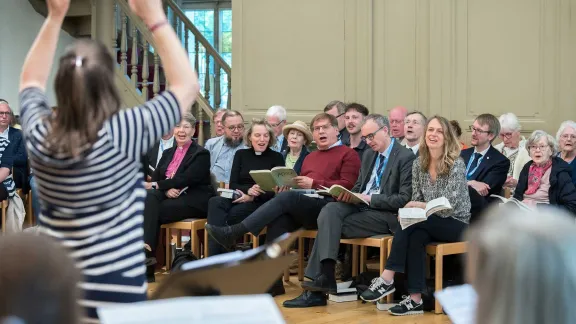
LWF Council members join the local congregations of the Evangelical Lutheran Church of Geneva for Sunday worship. Photo: LWF/A. Hillert
In her greeting, the Vice-President for Central Western Europe, Bishop Kristina Kühnbaum-Schmidt from the Evangelical Lutheran Church in Northern Germany, spoke of the theme of the Council meeting - “Abound in hope” - that conveys trust in being enveloped by God’s care like a child in its mother’s womb.
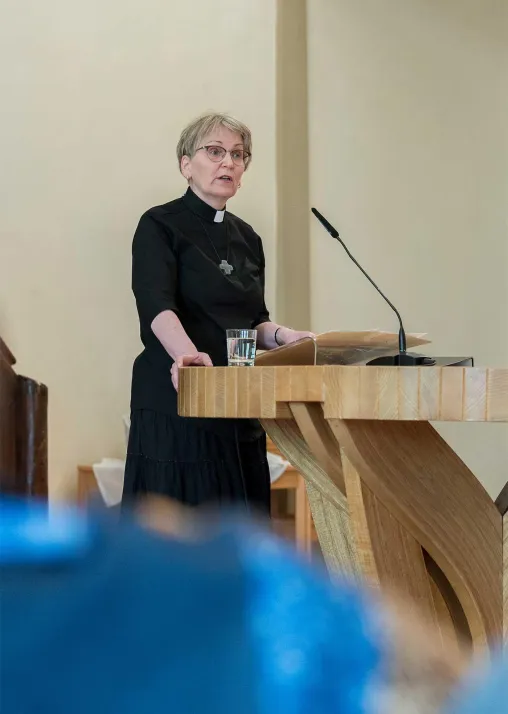
LWF Vice President for the Nordic region, Rev. Dr Arnfriður Guðmundsdóttir preaches during Sunday worship at the Evangelical Lutheran Church of Geneva. Photo: LWF/A. Hillert
The Vice-President for Central Eastern Europe, Bishop Dr Tamás Fabiny from The Evangelical Lutheran Church in Hungary, referred to the wall of the reformers in Geneva, saying that Stephan Bocskay was one of the persons honored in that monument. Several reformation initiatives had come from Eastern Europe, he said, before the counter-reformation resulted in many of the churches in the region becoming minority churches.
LWF General Secretary Rev. Dr Anne Burghardt presented a replica of the Lund cross to the Evangelical Lutheran Church in Geneva, as a sign of mutual connection. The cross is “an expression of hope,” she said, pointing at Jesus Christ as a “source of our hope.”
Serving God and neighbor
Instead, Zell became one of the first women to marry a pastor and, despite opposition, served actively alongside him in ministry to the sick and disadvantaged. In her writings and her words, she defended her right to serve God by citing Luther's principles of the priesthood of all believers, the estate of marriage and his cross-centered theology.
Guðmundsdóttir noted that Zell is “an important example for all of us who have been called to serve God, whether it is through ordained ministry or other offices.” Recalling Luther’s words that “Baptism was the real ordination,” she said the principle of the priesthood of all believers reminds us that “ordained ministry is in no way more important than any other office or role we play at home or out in the society.”

LWF President Bishop Henrik Stubkjær and other Council members join in singing and dancing during vibrant Sunday worship at the Evangelical Lutheran Church of Geneva. Photo: LWF/A. Hillert
Serving God and neighbor
Instead, Zell became one of the first women to marry a pastor and, despite opposition, served actively alongside him in ministry to the sick and disadvantaged. In her writings and her words, she defended her right to serve God by citing Luther's principles of the priesthood of all believers, the estate of marriage and his cross-centered theology.
Guðmundsdóttir noted that Zell is “an important example for all of us who have been called to serve God, whether it is through ordained ministry or other offices.” Recalling Luther’s words that “Baptism was the real ordination,” she said the principle of the priesthood of all believers reminds us that “ordained ministry is in no way more important than any other office or role we play at home or out in the society.”
There are visible and invisible hierarchies, in churches and out in societies
LWF Vice President for the Nordic region Rev. Dr. Arnfriður Guðmundsdóttir
Guðmundsdóttir noted that "still today, women are told they are not able to serve as deacons, pastors or bishops, just because they are female and not male, weak and not strong, foolish and not wise, low and not high.” She added that there are “visible and invisible hierarchies,” where some ordained women “are not treated as equal to their ordained male colleagues.”
She recalled the “compelling testimony” offered at the Kraków Assembly by Polish women who had waited, sometimes for decades, for “their chance to respond to God’s call” to ordained ministry. Quoting the participants at the women's Pre-Assembly, she concluded: "Profound sentiments about family and the unique role of women hold no significance unless we view them as equal partners in the life of the church and society.
